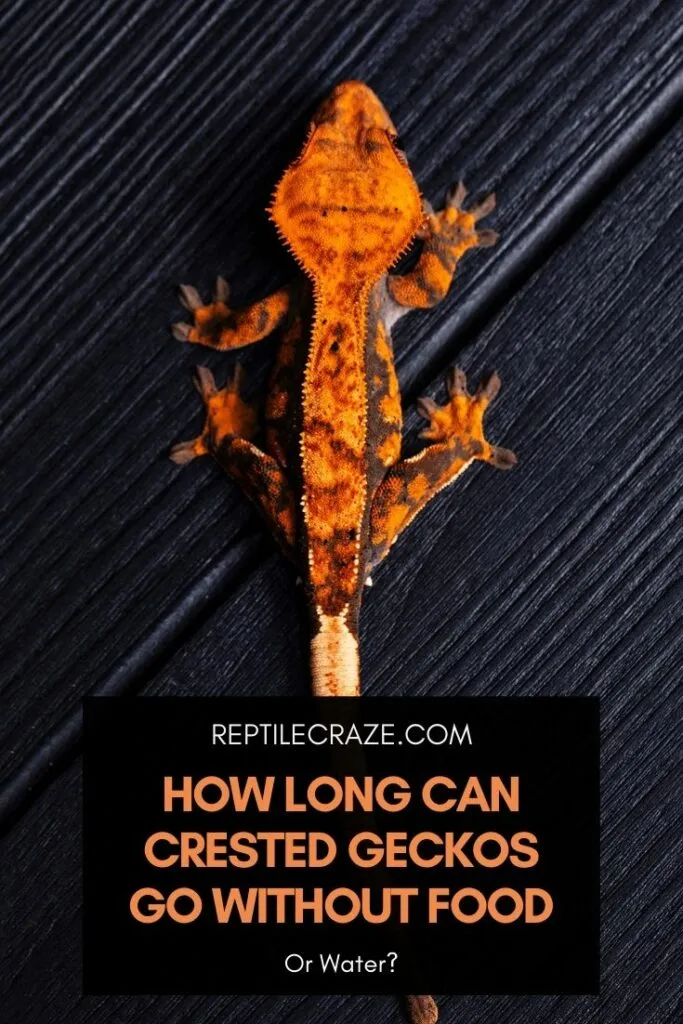
Crested Geckos (Correlophus ciliatus) are very popular reptiles to keep as pets. These lizards may, on occasion, stop eating for periods of time, which can be worrisome for their owner. So, how long can Crested Geckos go without
Crested Geckos can go without
In this article, we will explore what your Crested Geckos should be eating and drinking. We will also find out more about the reasons that Crested Geckos may stop eating normally.
Table of Contents
How Long Can Crested Geckos Go Without Food ?
Crested Geckos, like many reptiles, do not need to eat every day. In fact, it is advisable to feed them only every other day. The best time to offer
| Age of Crested Gecko | How many times per week should they eat? | How Long Can They Go Without Eating? |
| Hatchling 0-2 months | 6-7 times per week, following their first molt. | 2-3 days (but possibly up to 6 days, directly after hatching). They will eat after the first molt happens. Have |
| Baby Juvenile 2-6 months | 5-6 times per week | 5 days. Consult the vet after 3 days. |
| Juvenile 6-12 months | 4-5 times per week. | 1 week. Consult the vet after 5 days. |
| Sub-adult 12-18 months | 3-4 times per week. | 2 weeks or so. Consult the vet after 1 week. |
| Mature-adult 18+ months | 2-3 times per week. | 3 weeks. Consult the vet after 2 weeks. |
How Long Can Adult Crested Geckos Go Without Eating?
Crested Geckos may stop eating for a number of reasons, and usually, this is not a cause for concern. However, if the Gecko continues to not eat for 2 weeks, it is time to consult the vet. It is possible that the vet will advise you to continue monitoring your Crested Gecko, but at least the issue will be noted and the vet can respond quickly if the situation worsens.
In most cases, the gecko will resume eating before 3 weeks have passed. Commonly, they stop eating when moved to a new habitat or when changes are made in their environment. It can take a few weeks for them to adapt to this change.
You can help them along in this process by ensuring that the humidity, temperature, lighting levels, etc are all correct. Also, you should disturb your gecko as little as possible.
How Long Can A Juvenile Crested Gecko Go Without Eating?
Young Crested Geckos, from hatchling through to juvenile, need feeding more often than sub-adults and adults. You can offer
As they age, begin to punctuate your feeding schedule with days off. Eventually, by the time they are sub-adults, they should only be eating every other day.
If you notice signs of being overweight, or your weighing schedule reveals that they are gaining weight too fast, feed them less often.
As young Crested Geckos need to eat more often, you also should not let them go as long without eating if they refuse
However, be aware that newborn hatchlings may not eat immediately. It will usually only begin to eat after its first shed. This is generally about 2-3 days after hatching, but could be longer.
All the same, you should make sure that fresh
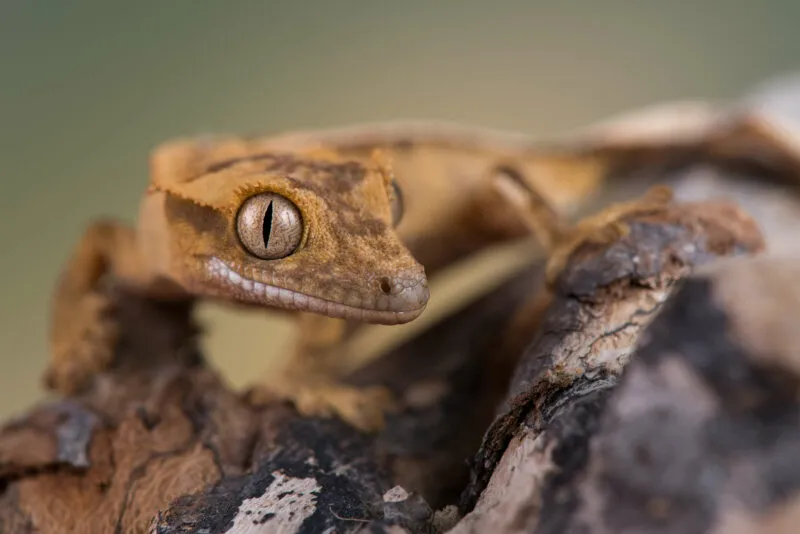
Can My Crested Gecko Become Over Or Underweight?
Yes, Crested Geckos can become obese or underweight. It is important to weigh your Crested Gecko and track its growth or body changes over time. Weigh your gecko about once per month.
An efficient method to weigh a gecko is to put a container that is large enough for them to fit in onto the weighing scale. Tare the scale, making it read zero with the container on it.
Then, place the gecko into the container and close it. Wait for a steady reading and record the gecko’s weight. Keep track of changes over time.
If the gecko’s weight changes by only a few grams or is stable, then everything is great. However, if there is rapid weight loss, you need to get in touch with your vet.
Signs Of Being Over or Underweight in Crested Geckos
The tail of the Crested Gecko should look rounded. While young geckos might be slimmer and show their ribcage, this is a sign of being underweight in an adult gecko. The gecko should look more rounded as it grows.
An overweight Crested Gecko will show signs of fat in the legs. The legs should not have fat chubs and rolls.
How Much Should My Crested Gecko Weigh?
| Age of Crested Gecko | Approximate Healthy Weight |
| Hatchling 0-2 months | 1.5-2 grams |
| Baby Juvenile 2 months | 3 grams |
| Baby Juvenile 3 months | 4 grams |
| Baby Juvenile 4 months | 5 grams |
| Baby Juvenile 5 months | 7 grams |
| Juvenile 6-9 months | 9-17 grams |
| Juvenile 9-12 months | 16-30 grams |
| Sub-adult 12-18 months | 30-50 grams |
| Mature-adult 18+ months | 35-55 grams 65+ grams = obese |
Why Isn’t My Crested Gecko Eating?
The most common answer is that your gecko is stressed by the environment and has simply stopped eating for a short period. However, there may also be signs of sickness or natural bodily functions happening that prevent your gecko from eating. Let’s take a closer look at what could be wrong:
Environmental Stress
A common response to being moved to a new habitat is for a Crested Gecko to stop eating. This could take up to a few weeks to resolve itself but should be fine.
Check the temperature, light, and humidity levels in the habitat are all correct. Ensure that the habitat is appropriately sized. The key is to ensure that the habitat is appropriate for the needs of the Crested Gecko and to disturb it as little as possible while your pet acclimates.
Social Stress
Your gecko may be subject to bullying if it is part of a group. This social stress could cause it to stop eating. The lack of eating may be more chronic than environmental stress as the cause of the stress is ongoing.
Check your gecko for scratches and bites. Observe the behavior of the group.
If you identify that your gecko is being bullied, separate it from the group. The gecko may take some time to recover and begin eating again after being separated.
Shedding
It is very common for reptiles to stop eating over the period of their shed. If your Crested Gecko has stopped eating, wait until the shed has finished by a day or so before becoming overly concerned.
Impaction
In the unfortunate case that your gecko has eaten something that it could not digest, it could become stuck inside them. This is called impaction, and it is dangerous.
The signs of impaction include very sudden weight gain as
In this case, try to gently massage the belly of your Crested Gecko. Feed him only liquid foods and try to increase hydration. If the impaction does not pass within a few days, call the vet.
You can avoid impaction by only feeding invertebrates that are narrower than the width between your gecko’s eyes. It is also advisable to avoid loose substrates that could be swallowed. This is especially important for young Crested Geckos.
Illness and Infection
This is also a concerning possible cause of your gecko not eating. Watch out for vomiting, diarrhea, foul-smelling waste, and lethargic behavior. If you suspect that your pet is sick, you should call the vet.
Parasites
The signs of parasites in the digestive tract of your gecko are similar to that of other illnesses. If you notice that your Crested Gecko is having problems with vomiting, diarrhea, or constipation, there may be intestinal parasites present. Often, the waste products will smell much worse than usual.
You need to contact your vet about this issue as soon as possible. It would be very useful to collect a fecal (poop) sample and take it to the vet appointment, as it will probably need to be tested.
Mouth Rot (Ulcerative Stomatitis)
Mouth rot occurs when tiny cuts around your gecko’s mouth become infected. It is a fairly common health complaint in Crested Geckos. Signs of mouth rot are redness and mucus around the mouth.
The infection needs antibiotic care. You should contact your vet if you notice these signs.
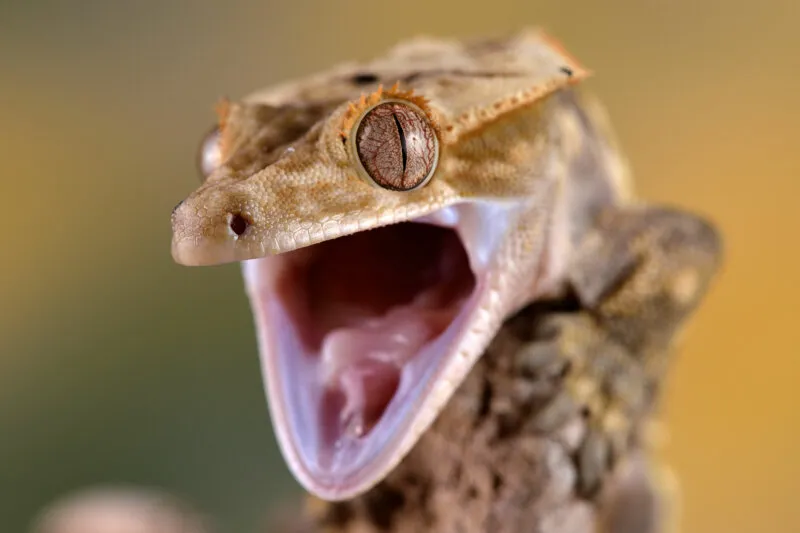
Life Stage
Hatchlings usually do not eat at all until after their first shed. Don’t worry if newborn geckos arent eating for the first few days.
Juvenile geckos approaching adulthood eat a large amount. They need to put on a lot of weight in a short time. Thereafter, they may suddenly decrease their
However, it may be entirely normal. Continue to monitor their weight and body condition to see if they begin losing weight or simply maintain it.
Seasonal Changes
Related to environmental stress, seasonal changes can also cause periods of non-eating in Crested Geckos. Despite being in captivity, geckos are still sensitive to the changes in seasons. In fall and winter, they may show decreased appetite and activity.
Breeding
In many species, males often become very fixated on mating rituals at the beginning of a breeding season. Even when in separate enclosures, geckos are likely to notice the presence of other sexually mature geckos nearby. They may stop eating when they sense an opportunity to mate.
Furthermore, females may stop eating in the days leading up to ovulation or egg-laying. Related to social stress, they may also stop eating if they have no respite from the attentions of male geckos in their enclosure.
Incorrect Diet
Your Crested Gecko may have stopped eating simply because you are feeding it the wrong things.
Crested Geckos are omnivorous, meaning that they can eat both meat and vegetation. In their natural habitat, their diet is made up almost entirely of a wide variety of insects. However, they also eat some fruits.
In captivity, Crested Geckos do very well on quality premix powder foods. This is often referred to as CGD (Crested Gecko Diet). These contain the perfect balance of nutrients, vitamins, and minerals.
Avoid feeding CGDs that contain wheat, bran, or rice, as these filler foods are not suitable for your gecko.
Crested Geckos have been shown to survive well on this pre-mix diet alone, but that does not mean it is a good idea to feed the CGD exclusively.
Research has shown that juvenile Crested Geckos will put on more weight when eating a naturalistic diet of calcium-dusted cockroaches with papaya, than when fed only CGD powder-mix. (Atamian, 2020).
Furthermore, in order to provide mental stimulation, a varied diet is important. Wouldn’t you be bored of eating if you were only given soup every day?
Incorporating live feed invertebrates into your gecko’s diet will give them better nutrition as well and physical and mental stimulation.
Fruit can be given as more of a treat, since quality CGDs should contain all the vitamins found in fruits. Let’s delve deeper into what fruits, invertebrates, and feeds we should be feeding.
What Live Feed Should I Give My Crested Gecko?
Here is a list of safe invertebrates that you can feed live to your Crested Gecko:
- Crickets
- Locusts
- Cockroaches
- Stick insects
- Bluebottles
- Nutrigrubs
- Snails
- Waxworms (high in fat)
- Silkworms (high in fat)
A good rule of thumb is to release invertebrates into the gecko habitat under observation. Give the gecko as many as it will eat within 15 minutes.
Do not leave insects in the terrarium after this point, because hungry insects may bite at your gecko’s delicate skin. With some trial and error, you will come to know the approximate amount that your gecko needs.
Juvenile and sub-adult Crested Geckos have the same diet as adult Crested Geckos. Naturally, they should be fed smaller pieces of
Some owners prefer to feed a higher proportion of live feed over CGD to juvenile animals. This is because evidence suggests that the high protein intake helps support growth and weight gain during their growing phase.
What Invertebrates To Avoid Feeding Your Crested Gecko
Mealworms and Superworms are not the best choices to feed your Crested Gecko because they have a hard exoskeleton. This can be difficult for the Crested Gecko to digest.
Avoid feeding any invertebrates that are wider than the distance between your Crested Gecko’s eyes. This distance is an approximation of the width of your gecko’s throat. Prey that is wider than this may become lodged in the throat or digestive tract of the gecko and cause impaction.
Some invertebrate types are higher in fat than others. Crickets, locusts, cockroaches, Nutrigrubs, and the like can be used frequently as a staple in your gecko’s diets. Limit your use of silkworms and waxworms as they are so high in fat.
It is possible to overfeed a Crested Gecko, as they store fat in their tail and can become overweight.
Do not feed live invertebrates if you have not gut-loaded them. Gut loading means feeding and hydrating the invertebrates for 24 hours before giving them to the gecko.
The gecko will ingest not only the live feed, but all of its stomach contents too. This is a great way to deliver extra hydration and nutrition. Specialized gut-loading mixes or vegetation can be used.
Never feed wild-caught invertebrates to your gecko, as they may be carrying disease or contaminants. This could make your pet very sick. It is always advisable to buy live feed from a reputable seller.
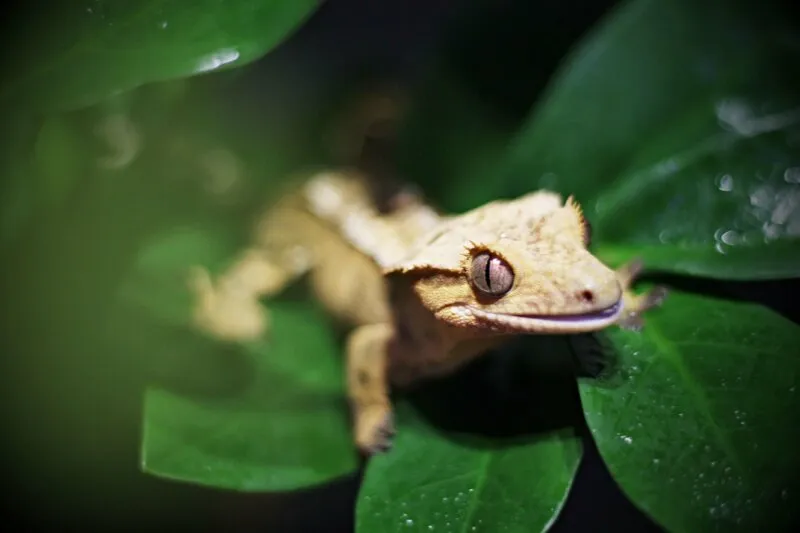
What Fruit Can I Feed My Crested Gecko?
Again, this is widely debated. A good rule of thumb is to feed “as a treat”. Although for some pet owners this means multiple times a week, and for others, once a month.
Given that you are feeding your geckos once every other day, this totals 3 or 4 feedings per week. My advice then would be to include fruit 2-4 times per month.
So, once per week or once per every other week. This is a conservative and safe recommendation so that you won’t be overdoing it.
Fruit is usually delivered to Crested Geckos mashed-up. You can put it in the same type of feeding bowl you would use for water or CGD mix. Fill the dish with the same amount of fruit as if you were giving the CGD mix.
Here’s a list of safe fruits to feed your Crested Gecko:
- Blueberries
- Pears
- Papaya
- Strawberries
- Mango
- Raspberries
- Fig
- Blackberries
- Grapes
- Apples
- Melon
- Cherries
- Pomegranate
What Fruits To Avoid Feeding Your Crested Gecko
Never feed citrus fruits or bananas to your Crested Gecko. These fruits can inhibit the uptake of calcium or may cause diarrhea.
Also, never feed avocado, as it contains persin (a fungicidal toxin) and this could be harmful. Starfruit is also a bad idea, as it contains such high oxalate levels. Rhubarb is also toxic to Crested Geckos and many other animals.
It is easy to give your gecko too much fruit and deliver high concentrations of oxalic acid or vitamin C by accident. This is especially true since modern CGD mixes are comprehensive and fulfill all the nutritional needs that would have been provided by the fruit.
Don’t give unwashed fruit to your gecko. It could be coated in harmful chemicals such as pesticides. Always rinse it first.
While there is some disagreement among Crested Geko enthusiasts regarding which fruits are beneficial or harmful, all agree that citrus fruits should be avoided. The most popular and widely-fed fruits seem to be papaya, mango, and berries.
Could A Crested Gecko Starve Itself To Death?
Generally, a Crested Gecko will not starve itself to death. It has a biological drive to survive and will not refuse
If your Crested Gecko has been ignoring
By this point, you should already have consulted the vet. However, there are many possible issues you can address and try to solve to help your gecko start eating again.
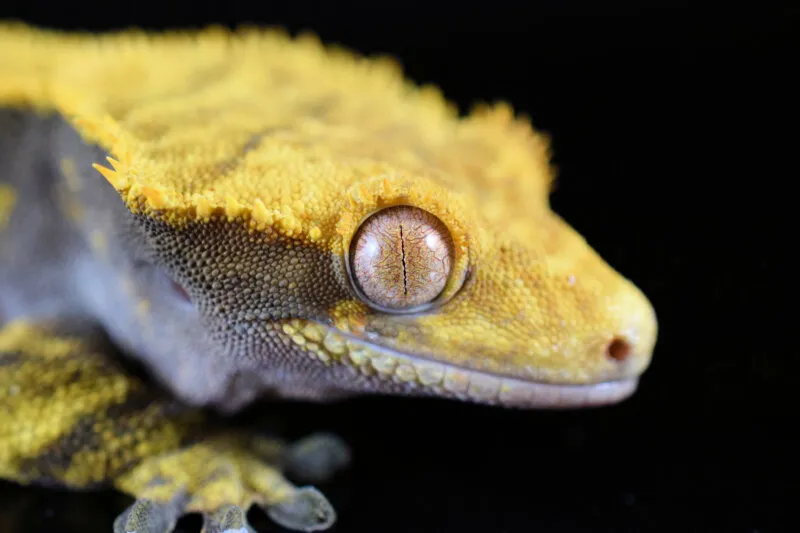
How Long Can Crested Geckos Go Without Water?
Crested Geckos can only go 3 days without water. Therefore, it is a much more serious issue if your gecko stops drinking.
There are 3 main ways to supply your Crested Gecko with water:
Firstly, you should always have a fresh supply of drinking water in the habitat.
Change it when you feed the gecko (every other day), unless it looks a bit dirty, in which case of course do change it sooner.
Secondly, you should be misting the enclosure in order to maintain the correct humidity level.
60-80% humidity is a good level for the habitat to reach when sprayed with water. In between sprays, the
Depending on factors such as the size of your
Lastly, Crested Geckos can absorb water from the bodies of invertebrates that you give them as live feed.
It is important to gut-load your live-feed invertebrates by giving them a good meal and drink before you feed them to the geckos.
Can Crested Geckos Survive Without Food When You Are On Vacation?
The short answer is no, you cannot. Despite the fact that Crested Geckos can go up to 3 weeks without eating does not mean it is OK to go away and not feed them.
Geckos may stop eating for a variety of reasons, and some of them are nothing to worry about. However, it must be because the gecko has chosen to stop eating, and not because you are depriving them of
Besides, remember that geckos can only last 3 days or so without water, and need frequent misting to maintain their humidity. Beyond that, they may become sick or injured, and if you are on holiday you would not be there to notice and care for them.
If you go away on vacation, arrange for a friend who knows about Crested Geckos to drop in on them daily. They can check that your beloved pets are doing well, give them treats and send you updates!
If you want to learn what to do with your Crested Gecko when you are on vacation, read our article on that here.
- Eastern Rat Snake: Nature’s Pest Control and Fascinating Reptile - September 20, 2024
- Eastern Racer: The Fast and Agile Snake - September 19, 2024
- The Eastern Indigo Snake: The Majestic, Non-Venomous Hunter of the Southeast - September 18, 2024
